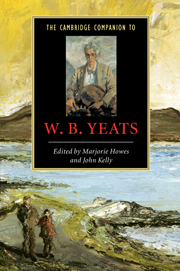Book contents
- Frontmatter
- 1 Introduction
- 2 Yeats and Romanticism
- 3 Yeats, Victorianism, and the 1890s
- 4 Yeats and Modernism
- 5 The later poetry
- 6 Yeats and the drama
- 7 Yeats and criticism
- 8 Yeats, folklore, and Irish legend
- 9 Yeats and the occult
- 10 Yeats and gender
- 11 Yeats and politics
- 12 Yeats and the postcolonial
- Bibliography
- Index
6 - Yeats and the drama
Published online by Cambridge University Press: 28 January 2007
- Frontmatter
- 1 Introduction
- 2 Yeats and Romanticism
- 3 Yeats, Victorianism, and the 1890s
- 4 Yeats and Modernism
- 5 The later poetry
- 6 Yeats and the drama
- 7 Yeats and criticism
- 8 Yeats, folklore, and Irish legend
- 9 Yeats and the occult
- 10 Yeats and gender
- 11 Yeats and politics
- 12 Yeats and the postcolonial
- Bibliography
- Index
Summary
In a note to his play At the Hawk's Well in 1916, Yeats said “I need a theatre; I believe myself to be a dramatist” (VPl415). T. S. Eliot declared in his 1940 anniversary lecture on Yeats: “I do not know where our debt to him as a dramatist ends - and in time, it will not end until that drama itself ends.” Yet, putting it at its most positive, there can be few major dramatists about whose standing there is so little critical consensus as Yeats. He was a prolific writer of plays throughout his life; only Shaw, of the major playwrights in English of his time, wrote more. His earliest writings are dramatic, from the “Arcadian play” The Island of Statues in 1885 onwards, and in the late 1880s he is already discussing with George Russell and John O'Leary the possibility of writing poetic drama. Throughout his life he described his literary achievements in terms of the dramatic. Yet from the first his plays had at best an uncertain critical reception. Moreover, it was an uncertainty with which Yeats himself seemed to be in sympathy, to judge from what he says about the stage in his great, career summarizing late poem “The Circus Animals' Desertion.” After mentioning his early (and favorite) play The Countess Cathleen, the poem concludes by expressing reservations about his involvement with drama as a whole: “Players and painted stage took all my love, / And not those things that they were emblems of” (VP630). This final judgement recorded in the poetry seems to be that Yeats's creative career lost its way through concern with the stage: an impression seemingly confirmed in the poem's familiar last stanza, which advocates a return to “the foul rag-and-bone shop of the heart,” implicitly leaving aside all theatrical effects. It is a return to an old theme: at earlier moments of disillusion Yeats had expressed the same regrets, as in “The Fascination of What's Difficult” in the Green Helmet volume (1910), written at the height of his most concentrated involvement in “theatre business” (VP260) and partly motivated by such events as the negative audience response to Synge's The Playboy of the Western World at the Abbey Theatre in 1907.
- Type
- Chapter
- Information
- The Cambridge Companion to W. B. Yeats , pp. 101 - 114Publisher: Cambridge University PressPrint publication year: 2006
- 1
- Cited by



